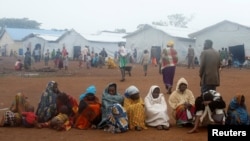Ugandan officials say thousands of refugees from the Democratic Republic of Congo are streaming across the border to escape fighting between armed groups. Uganda Red Cross Society officials say the numbers are overwhelming humanitarian response teams.
Men, women, and children from eastern Congo are being registered and assessed at the Kisoro district transit center.
Twenty-two-year-old Ange Nema, speaking to VOA by phone, said her village of Kibaya was rocked by gunfire and this forced them to flee.
She said she and others had a very rough journey. She said they suffered, going on foot, and having to run with their belongings, getting exhausted. She said they could not find a place to sleep and had to sleep out in the cold. It was intense, she added.
Fighting is reported between armed groups in the areas of Tshanzu and Runyonyi near Congo's Virunga Mountains, leading to the exodus.
The United Nations refugee agency, UNHCR, says the fighting has forced 11,000 people to flee into Uganda since late Sunday.
Kisoro district Red Cross branch manager Natukunda Primrose says many of the refugees slept at the border because there were no vehicles to transport them to a school facility that is being used as a transit center in the town of Nyakabande.
“They are tired and most of them were coming in with just maybe, a mat, a mattress and maybe their animals, like the sheep, the goats. They need support and I don’t think they’ve even had anything to eat,” Primrose said.
Rukundo Manasseh, the Kisoro district disaster management committee chairperson, called the situation at the border alarming. He said the refugees need protective gear, medicine, food, water, and hand washing facilities.
He also said they need tracing services - especially for misplaced children.
“That number is a bit abnormal. We have never had such big numbers before. What we are working on is closing with UNHCR to see if they can come in quickly and for those who are willing to move to camps, and they are picked away,” Manasseh said.
UNHCR says together with the Ugandan government, they have so far relocated about 500 asylum seekers to the Nyakabande transit center, which can accommodate up to 1,500 people.
UNHCR officials are concerned that that local capacity and services may be soon overwhelmed and request urgent resources to address the needs of the new arrivals.
The agency says, so far this year, it has received only 45% of the funding for its operations in Uganda, a country that hosts some 1.4 million refugees, more than any other in Africa.




